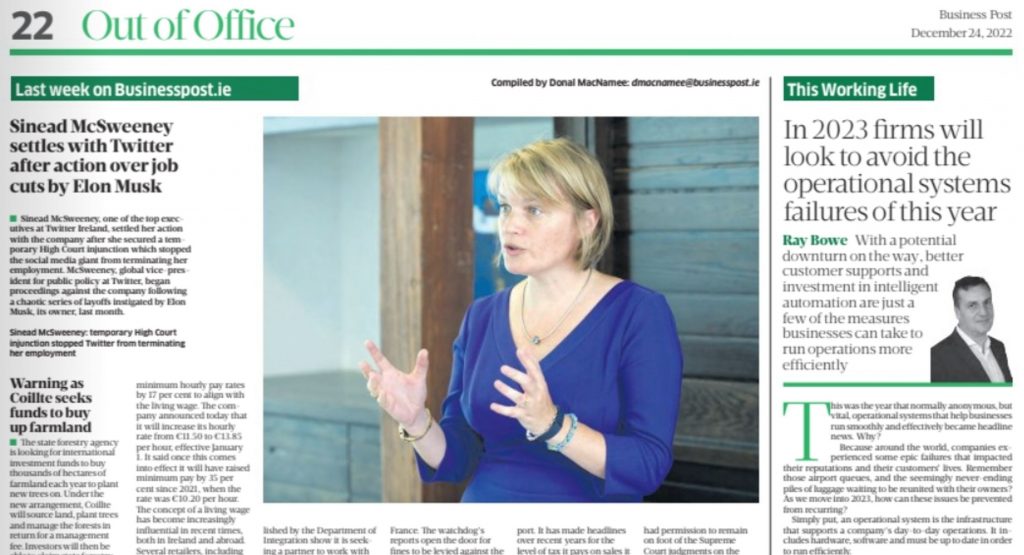
Published in the Business Post 24th December 2022

THIS WORKING LIFE
With a potential downturn on the way, better customer supports and investment in intelligent automation are just a few of the measures businesses can take to run operations more efficiently.
In 2023, firms will look to avoid the operational systems failures of this year.
(RAY BOWE) DECEMBER 24, 2022
Ray Bowe is the Chief Executive of Xcentuate, which specialises in using digital solutions to boost business productivity and performance, xcentuate.com
This was the year that normally anonymous, but vital, operational systems that help businesses run smoothly and effectively became headline news. Why?
Because around the world, companies experienced some epic failures that impacted their reputations and their customers’ lives. Remember those airport queues, and the seemingly never-ending piles of luggage waiting to be reunited with their owners’° As we move into 2023, how can these issues be prevented from recurring?
Simply put, an operational system is the infrastructure that supports a company’s day-to-day operations. lt includes hardware, software and must be up to date in order to run efficiently.
In many cases, it’s the heart of a company – everything else revolves around it. With an unpredictable 2023 hovering into view, business needs to prepare for every eventuality, including a potential downturn, tightened costs, and capacity and productivity issues.
Some new research from Xcentuate’s partners at ActiveOps in Britain shows that the need to take action and start planning for a potential downturn is urgent.
According to the research, 5S per cent of businesses know they have spare capacity within their organisation, but done know where or how to access it. Almost 60 per cent of employees also believe that their business needs better forecasting and planning during a recession.
This indicates that a combination of better foresight and insights into day-to-day operations will be key to supporting employees and responding to customers when circumstances change rapidly.
One in four of the businesses surveyed did not have the information needed to improve productivity or efficiency, while 29 per cent lacked reliable forecasts of future work levels.
What are the trends we are going to see more of in 2023 for this vital company function, trends that should hopefully address some of the research findings?
Investment In Intelligent automation
In 2023, more firms will have a cohesive approach to investing in software and training staff to optimise the available technology and deliver smooth-running operations.
At Xcentuate we’re seeing more opportunities emerging for robotics and automation. Firms are recognising that valuable talent in-house not be wasted on low-level tasks when automation can do them, freeing up key staff for other more meaningful and satisfying work.
Doing more with less
It’s no surprise that with inflation running at close to 10 per cent and a tougher economic environment looming, there will be a stronger focus on costs. Firms will be looking for targeted solutions which will deliver cost savings where the impact can be felt quickly. Solutions such as automated digitization of documents to reduce effort and reduce the postage bill are on the agenda.
Better customer supports
As one of the most complained about aspects of many business operations, more companies are prioritising delivering better customer interactions and support in the new year. Why? Because there‘s a recognition that many customers have complex requests that cannot be dealt with by ‘one size fits all solutions. Much more consideration will be given to designing processes and solutions that address these needs and see an uptick in customer experience.
Addressing the Data swap
Firms are swamped with valuable data that, while essential for business planning, is expensive to collect. lt’s commonly accepted that data-driven insights are business gold, but a worrying number of firms are missing out on these insights because they don’t have the systems that can analyse this material.
We predict that more firms will address this problem in 2023, unlock their data potential, and derive more value from it. Companies are looking for new solutions to bring data together in one place and deliver actionable insight.
For example, we are seeing companies look for one solution for all their operational and service providing managers with real actionable insight to more effectively manage their operations.
Computers and connections
Next year, progressive businesses will be future-proofing their operations by investing in cutting edge software that connects their systems into one seamless flow of information.
This will allow them to do everything from delivering great customer experiences to planning the best use of human resources, charting and improving productivity and capacity, while also generating data that informs business planning.
Building resilience and agility into operations will be crucial for organisations, particularly in the finance sector. Leaders will need to facilitate a culture of cross-team collaboration to support overworked teams, clear backlogs and enable flexibility when the unexpected happens.
!n order to unlock capacity, leaders must have an accurate overview of capacity within their organisation by analysing the work teams and individuals are doing to understand where capacity is hiding.
A continuing lack of insight into workload volumes and day-to-day operations will mean that leaders are unable to make critical decisions or respond to spikes in demand due to a lack of operational agility. This could ultimately cause businesses to fall short of organisational objectives, costing revenue and profit.
